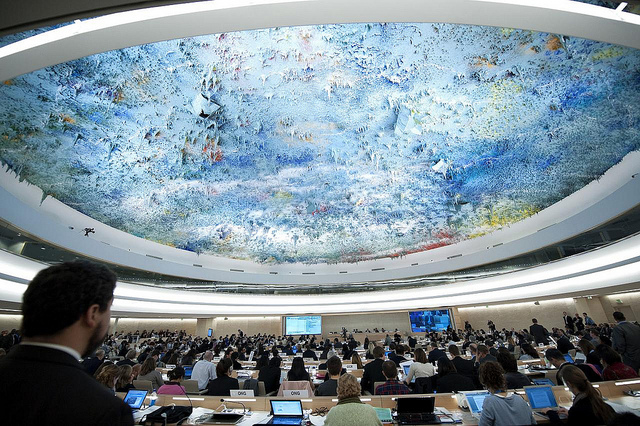
At the conclusion of its 23rd Regular Session this month, the UN Human Rights Council adopted by consensus Resolution A/HRC/23/6 on the “independence and impartiality of the judiciary, jurors and assessors, and the independence of lawyers.” The Resolution addresses a range of critical areas requiring State attention to ensure an independent legal system, from the impartiality of prosecutors to the funding of legal aid.
In the resolution, the Council expresses concern for the “increasingly frequent attacks on the independence of judges, lawyers, prosecutors and court officials, in particular threats, intimidation and interference in the discharge of their professional functions.” In this regard, it notes that national human rights institutions can play a crucial role in “in strengthening the rule of law and in supporting the independence and integrity of the judicial system.”
The Council also calls on all States to encourage diversity in their judiciary by ensuring the selection process of new judges is transparent and non-discriminatory. Moreover, once judges assume their position in the judiciary, they should be legally guaranteed tenure, “grounds for removal must be explicit with well-defined circumstances provided by law” and any removal procedures must “comply with due process” to ensure that judges may freely conduct rational legal analysis without fear of external interference.
With respect to government prosecution, the Council urges States “to ensure that prosecutors can perform their functional activities in an independent, objective and impartial matter.” Although the resolution does not provide further details for government action on this point, best practice dictates that States should at minimum provide adequate funding and measured government oversight of prosecutors, along with protections from political interference.
The Council also supports a strong role for civil society, with operative paragraph 6 of the resolution calling on bar associations, educational institutions and other “relevant national entities” to help “provide adequate training, including human rights training, for judges, prosecutors and lawyers, both on initial appointment and periodically throughout their career, taking into account regional and international human rights law.” Civil society organizations focused on human rights advocacy therefore could find it helpful to cite this resolution when trying to open up spaces to become actively involved in promoting and developing judicial impartiality and competency as essential prerequisites for ensuring human rights nationally.
The Council further emphasizes the need for strong legal aid programs fully supported by States. While the resolution stresses in particular the need for legal aid within the criminal justice system, the recent report from the UN Special Rapporteur on the Independence of Judges and Lawyers also emphasis that access to legal aid is critical for other types of legal cases that should include civil actions by individuals or groups seeking to ensure State respect for their human rights as well as defendants in criminal proceedings.
In closing the resolution, the Council calls on the Special Rapporteur on the Independence of Judges and Lawyers “to collaborate with relevant stakeholders within the United Nations system in the areas pertaining to her mandate,” and likewise for States to fully cooperate with the Special Rapporteur, including any requests for in-country visits. Although the resolution’s recommendations are general and brief, it highlights the importance of judicial impartiality as an international concern and civil society actors will find the resolution a helpful tool in their national advocacy to safeguard judicial independence.
